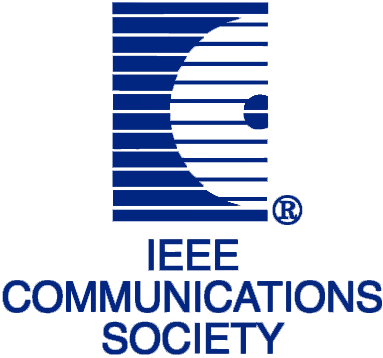Workshops
Schedule
| Workshop | Time | Location |
| Women in Engineering | 28 July, 9am | Auditorium |
| TSDSI: Standards Driven Research | 29 July, 9am | Auditorium |
| Applications of Machine Learning | 30 July, 3:30pm | Auditorium |
Women in Engineering
Active Hypothesis Testing for Fast Decision Making with applications to SARS-CoV-2 testing
Assessing Oral Reading Skills with Speech Processing
Technology Frontiers : Designing 5G chips in New Technology nodes
Particle Filter based Nonlinear Data Detection in Hybrid Mmwave Massive MIMO Systems
Privacy Preserving Inference in Medical Imagingby
|
Active Hypothesis Testing for Fast Decision Making with applications to SARS-CoV-2 testing By Prof. Urbashi Mitra Date & Time: 28th July 2021 (0900-1000 hours) Indian Standard Time |
|||||
| TOP | |||||
|
ABSTRACT: Many modern (machine) learning strategies depend on the intelligent acquisition of informative samples. Such sampling methods can be viewed as an instantiation of the exploration-exploitation problem. Initially, one is unclear about the state of the environment and the goal is to take observations that refine the understanding of the state. If one has a series of "experiments" (or queries), each of which provide information about the state, an important question is how to design that sequence of experiments to enable a decision about the environmental state as quickly as possible. Exploration-exploitation problems abound in applications such as anomaly detection, target localization, dynamical system tracking, medical diagnosis, wireless body area sensor networks etc. The problem of experiment design for classification (hypothesis testing) has been persistently studied since the 1940s. Then and now, there has been an emphasis on the design of asymptotically optimal methods. Herein, we will provide new analysis which enables the design of strategies for the finite sample regime. In key cases, our methods are also asymptotically optimal, but provide significantly improved finite sample performance. We specialize our analysis to the problem of anomaly detection for which we can determine asymptotically tight upper and lower bounds on the misclassification error and provide an experiment design strategy with excellent finite sample performance. We further consider the application of our approach to group-testing, wherein different experiments call for the pooling of samples which can dramatically reduce the number of experiments needed. Finally, we consider the problem of testing of populations to provide good spatial estimates of the incidence of an anomaly, such as SARS-CoV-2 positivity. We have preliminary analysis of SARS-CoV-2 serological tests based on randomized testing undertaken by a colleague at USC's School of Public Policy. Our proposed strategy suggests that uniform allocation for randomized testing over heterogeneous regions may not yield the best estimates of positivity rates and offers a method by which active hypothesis testing can be used to improve such estimates. SPEAKER: |
|||||
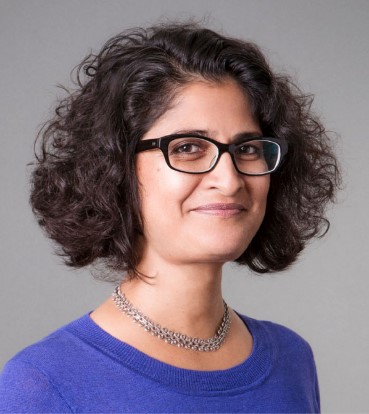
|
Prof. Urbashi Mitra received the B.S. and the M.S. degrees from the University of California at Berkeley and her Ph.D. from Princeton University. Dr. Mitra is currently the Gordon S. Marshall Professor in Engineering at the University of Southern California with appointments in Electrical & Computer Engineering and Computer Science. She was the inaugural Editor-in-Chief for the IEEE Transactions on Molecular, Biological and Multi-scale Communications. She has been a member of the IEEE Information Theory Society's Board of Governors (2002-2007, 2012-2017), the IEEE Communications Society's Boad of Governors (2018-2020), the IEEE Signal Processing Society's Technical Committee on Signal Processing for Communications and Networks (2012-2016), the IEEE Signal Processing Society's Awards Board (2017-2018), and the Chair/Vice-Chair of the IEEE Communication Theory Technical Committee (2017-2020). Dr. Mitra is a Fellow of the IEEE. She is the recipient of: the 2021 USC Viterbi School of Engineering Senior Research Award, the 2017 IEEE Women in Communications Engineering Technical Achievement Award, a 2015 UK Royal Academy of Engineering Distinguished Visiting Professorship, a 2015 US Fulbright Scholar Award, a 2015-2016 UK Leverhulme Trust Visiting Professorship, IEEE Communications Society Distinguished Lecturer, 2012 Globecom Signal Processing for Communications Symposium Best Paper Award, 2012 US National Academy of Engineering Lillian Gilbreth Lectureship, the 2009 DCOSS Applications & Systems Best Paper Award, 2001 Okawa Foundation Award, 2000 Ohio State University's College of Engineering Lumley Award for Research, and a 1996 National Science Foundation CAREER Award. She has been an Associate Editor for the following IEEE publications: Transactions on Signal Processing, Transactions on Information Theory, Journal of Oceanic Engineering, and Transactions on Communications. Dr. Mitra has held visiting appointments at: King's College, London, Imperial College, the Delft University of Technology, Stanford University, Rice University, and the Eurecom Institute. Her research interests are in: wireless communications, communication and sensor networks, biological communication systems, detection and estimation and the interface of communication, sensing and control. | ||||
|
Assessing Oral Reading Skills with Speech Processing By Prof. Preeti Rao Date & Time: 28th July 2021 (1000-1030 hours) Indian Standard Time |
|||||
| TOP | |||||
|
ABSTRACT: Education policies, both nationally and globally, accord the highest importance to achieving foundational literacy in the early school years. However, the regular assessment of progress, critical to the effectiveness of education interventions, tends to be expensive in terms of time and human resources. With oral reading being one of the important means of evaluating literacy and language competence, we present an automatic system for the objective evaluation of reading skill from audio recordings. Established reading rubrics that incorporate aspects of word accuracy, speed and fluency are modeled using speech recognition and prosody detection trained on expert ratings of field-collected data. We present the challenges posed by the task and research related to finding effective solutions. SPEAKER: |
|||||
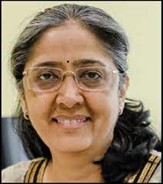
|
Prof. Preeti Rao is on the faculty of Electrical Engineering at I.I.T. Bombay, in the area of signal processing for speech and audio. She received her Ph.D. from the University of Florida in Gainesville in 1990. Her research interests include speech recognition, speech prosody and music information retrieval. She has been involved in the development of technology for Indian music and spoken language learning applications. She co-founded SensiBol Audio Technologies, a start-up incubated by I.I.T. Bombay, with her Ph.D. and Masters students in 2011. She is a recipient of the Abdul Kalam Technology Innovation National Fellowship for 2020. | ||||
|
Technology Frontiers : Designing 5G chips in New Technology nodes By Mamta Bansal Date & Time: 28th July 2021 (1030-1100 hours) Indian Standard Time |
|||||
| TOP | |||||
|
ABSTRACT: 5G wireless innovation is transforming how the world connects, computes and communicates. A walk through the Technology and Innovations in development of leading 5G SoCs. New architecture trends are driving methodologies and design flow changes. We discuss the trends and opportunities of practical research in Concept to Silicon design solutions. SPEAKER: |
|||||
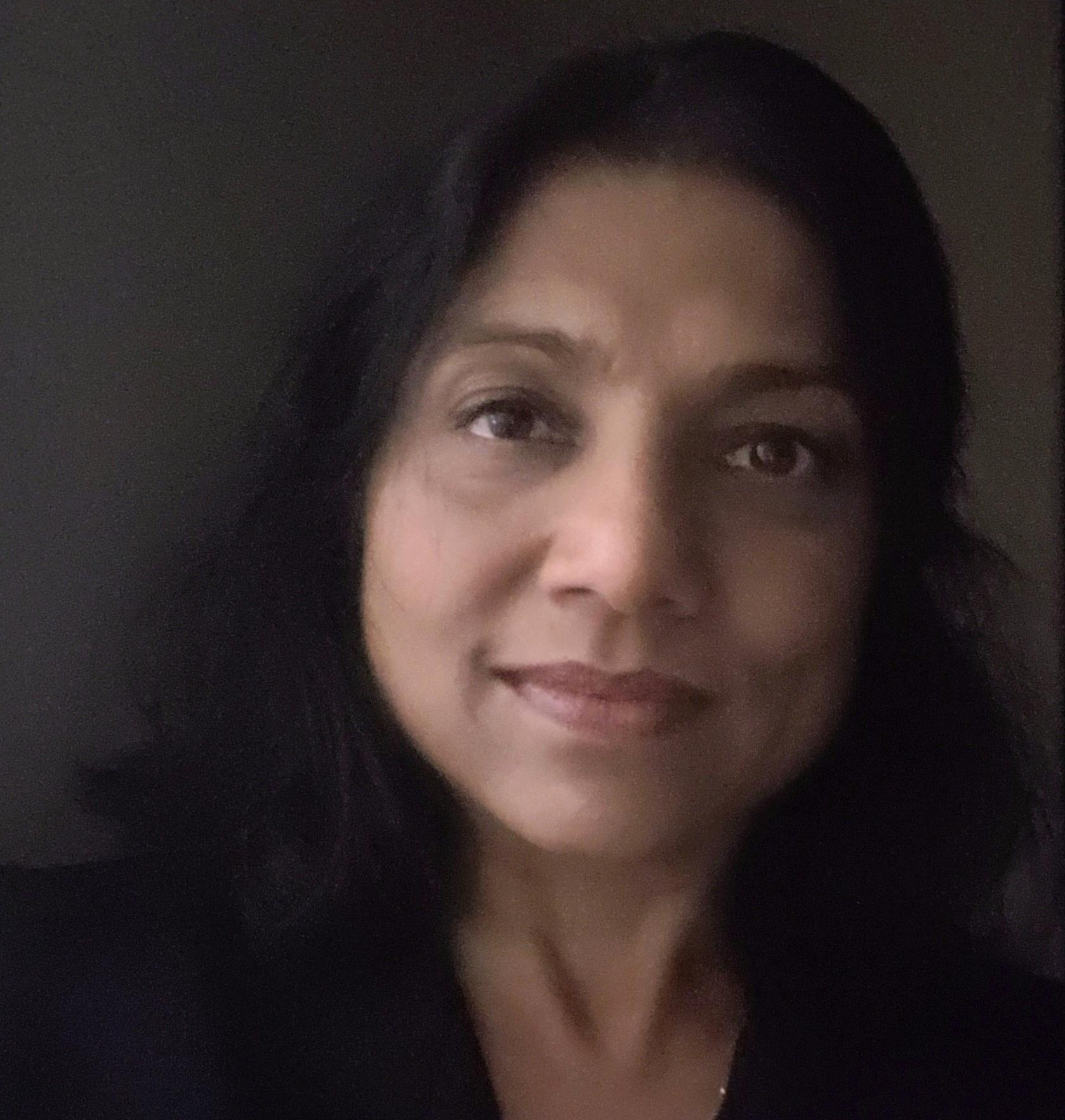
|
Mamta Bansal is Sr. Director of Engineering at Qualcomm Technologies Inc., where she leads the Global CAD chip Implementation solutions at Qualcomm Technologies Inc. She has over 25 years of experience in the semiconductor industry. Mamta joined Qualcomm in 2010 and has lead worldwide engineering teams responsible for RTL2GDS design flow for Qualcomm SoCs in cutting-edge advance process nodes. Prior, she held IP design manager, technology access manager and Director- EDA positions at PMC-Sierra Inc. Mamta received her education in Electrical Engineering from Indian Institute of Technology. | ||||
|
Particle Filter based Nonlinear Data Detection in Hybrid Mmwave Massive MIMO Systems By Prof. Debarati Sen Date & Time: 28th July 2021 (1100-1130 hours) Indian Standard Time |
|||||
| TOP | |||||
|
ABSTRACT: The nonlinear distortions attributed by the radio frequency (RF) power amplifier (PA) and other RF circuits from the enormous bandwidth of millimeter wave (mmWave) and high frequency design limitations of the integrated circuits involved, degrade the performance of the hybrid mmWave MIMO-OFDM systems. These distortions cause nonlinear coupling of the hybrid precoder with the data signals. Further, it induces intercarrier interference (ICI) in the OFDM systems, which also involves the interference from the precoders of other subcarriers. These difficulties in collusion with frequency selective channel and carrier frequency offset (CFO) may pose great challenges to the estimation accuracy of these parameters (channel gains and CFO) and signal detection. The nonlinearity causes the target posterior distribution for data detection as non-Gaussian and analytically intractable. A novel pilot assisted maximum likelihood (ML) based framework for estimating the CFO with PA impairment in the time domain by formulating a low dimensional equivalent channel matrix is presented here. This channel matrix is composed of hybrid precoders-combiners, high dimensional MIMO channel, and the nonlinearly distorted components from PA. Further, a group-sparse Bayesian learning (G-SBL) based semi-blind channel estimator is proposed in the time domain, which incorporates the CFO and nonlinearity of PA in its estimation process. With the estimated channel, a procedure to obtain the hybrid precoder and combiner matrices for data transmission is developed next. An iterative algorithm based on particle filter (PF) that effectively handles the nonlinear coupling of precoder matrix with data, and ICI is also proposed for data detection. Performance of proposed algorithm is evaluated over (a) synthetic geometric based mmWave channel and (b) realistic mmWave channel for an urban microcell (UMi) environment. SPEAKER: |
|||||
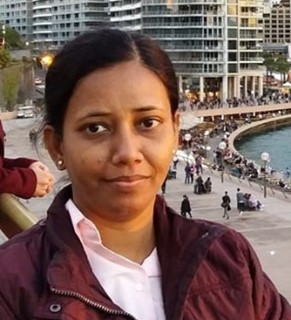
|
Prof. Debarati Sen is currently an Associate Professor, IIT Kharagpur, India. She was a Post-Doctoral Research Fellow with the Chalmers University of Technology, Sweden, and a Senior Chief Engineer with the Samsung Research, Bangalore, India prior to join IIT Kharagpur in 2013. In 2014, Dr. Sen was a visiting faculty with the Institute for Comm. Engg., TUM, Germany; and in 2019, she was an academic visitor with the Dept. of ECSE, Monash University, Australia. She has about 12 years of R&D experience overall related to the domains of Wireless and Optical Communications including Interdisciplinary Computing, mostly on 5G/6G Communications, AI enabled Wireless, Millimeter Wave and Terahertz Communications, Green Communications, Large MIMO, Cloud RAN etc. Her research is supported by a variety of Govt. Organizations including MHRD, MeitY, Min. of HI&PE, BEL, HAL, DST, DRDO, SERB, Indian Railways and external collaborators like AIRBUS, Samsung, Qualcomm (USA), Ericsson (Sweden), Rosenberger Technol. (China) etc. She has 13 patents published / applied to her credit including few US Patents, and has published more than 100 papers in Journals and Conferences of repute. She is an Editorial Board Member of two international journals; recipient of Best Paper Awards at Samsung Tech. Conference 2010 and IEEE ANTS 2016; IE(I) Young Engineers Award 2010; IETE N.V.G. Memorial Award 2013; Qualcomm Innovation Fellowship 2017, Faculty Excellence Award IIT Kharagpur 2020. She is a Senior Member of IEEE, Fellow of IE(I) and IETE. | ||||
|
Privacy Preserving Inference in Medical Imaging By Dr. Divya Gupta Date & Time: 28th July 2021 (1130-1200 hours) Indian Standard Time |
|||||
| TOP | |||||
|
ABSTRACT: Fueled by massive data and availability of extensive compute, sophisticated machine learning models have found diverse applications across verticals such as healthcare and finance. This has made the problem of privacy preserving machine learning increasingly important. In this talk, I will focus on two broad scenarios in the healthcare domain, namely secure prediction-as-a-service and secure model testing. In the prediction-as-a-service scenario, a hospital/ML provider has a machine learning model that has been trained on sensitive data, and patients have their private medical records. The goal is to enable the patients to learn the prognosis based on the model without revealing their sensitive medical data while preserving the confidentiality of the model held by the hospital. Secure model testing is a try-before-you-buy scenario where a hospital or a pathology lab wants to evaluate how the machine learning models from different vendors perform on its private data. This needs to be done without the hospital revealing their sensitive test data or the vendors revealing their proprietary models. Our work CrypTFlow provides a programmable, scalable and efficient cryptographic solution for both of these problems. CrypTFlow is a system that automatically compiles TensorFlow/ONNX inference code to secure computation protocols. It has two components. First component is an end-to-end compiler from TensorFlow/ONNX to a variety of secure computation protocols. Second, we build specialized protocols for secure machine learning for two and three party settings that are orders of magnitude more performant than prior works. We demonstrate that CrypTFlow is ready for disruption in secure healthcare by showcasing evaluation on multiple real-world case studies. These include ML models for detecting lung diseases including Covid19 from chest X-Rays, predicting frequency of doctor visits for Wet-AMD patients, and segmentation models for radiotherapy planning using 3D CT scans. SPEAKER: |
|||||
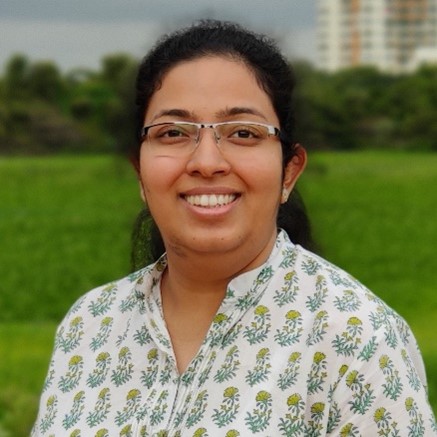
|
Dr. Divya Gupta is a Senior Researcher at Microsoft Research India. Her research interest is cryptography and its applications to security and privacy. Currently her work at MSR focusses on secure multiparty computation and blockchains, and in particular, making cryptography practical, usable, and performant. She has published several papers in top computer science conferences such as Crypto, Eurocrypt, IEEE S&P, ACM CCS, OSDI, and so on and holds 3 US Patents. Before joining MSR, she was a postdoc at UC Berkeley hosted by Sanjam Garg. She completed her PhD at University of California at Los Angeles with Amit Sahai. Her PhD dissertation was recognized by the Dissertation Fellowship and the Dimitris N. Chorafas Dissertation Award, given for outstanding work in engineering sciences, medicine and the natural sciences. She got her bachelors and masters degree in Computer Science and Engineering from Indian Institute of Technology, Delhi. | ||||
TSDSI: Standards Driven Research
Opening Session: Welcome Remarks
KEYNOTE: "The 5Gi Story - from Academic Research to a Global Standard"
CASE STUDIES:
Patent Perspective: How to Patent before publishing your paper/standardization
Standardization Opportunities for 6G: Research Problems in relation to 6G
PANEL DISCUSSION: "How to promote Standards Driven Research: What is the incentive?"
Closing Remarks and Way Forward
|
Opening Session: Welcome Remarks By Prof. Uday B Desai Date & Time: 29th July 2021 (0900-0905 hours) Indian Standard Time |
|||||
| TOP | |||||
| SPEAKER: | |||||
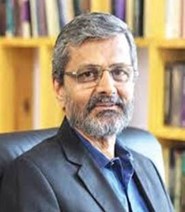
|
Prof. Uday B Desai
Prof. Uday B Desai is the Founding Director of Indian Institute of Technology, Hyderabad. He is Professor Emeritus at IIT Hyderabad. He is also the Chancellor of Anurag University. He is also Honorary Professor of Woosong University, South Korea. He was mentor director of IIT Bhilai from August 2016 to January 2017 and mentor director for IIIT Chittoor during the first five years of the founding of IIT Chittoor. Prof. Desai is currently associated with TSDSI as Strategy Consultant. |
||||
|
KEYNOTE: "The 5Gi Story-from Academic Research to a Global Standard" By Prof. Abhay Karandikar Date & Time: 29th July 2021 (0905-0935 hours) Indian Standard Time |
|||||
| TOP | |||||
|
ABSTRACT: The research and development of information and communications technologies especially wireless communications technology is being driven through global standardization efforts today. While these efforts are expected to transform the society, they also pose new challenges for nations and people who are unable to become a stakeholder in this process. The newer technologies are developed and standardized to take care of the needs of the stakeholders and those who are unable to participate in this process are likely to be left behind; their economic and national sovereignty threatened due to lack of IPR ownership. It is imperative therefore, that India as a nation embarks whole heartedly on this journey and become a key stakeholder in the global standardization efforts in ICT domain. This talk tries to highlight some of the significant steps taken by us in this direction in the recent past and explains how "standards driven research" can play an important role in making India a powerhouse in the world of technology and innovation. It discusses the story of 5Gi, an enhancement to 5G communications technology to take care of the needs of India, especially rural India. It also takes us through the arduous but successful and gratifying journey the 5Gi had to make to move from the confines of our academic institutions to a global standard. SPEAKER: |
|||||
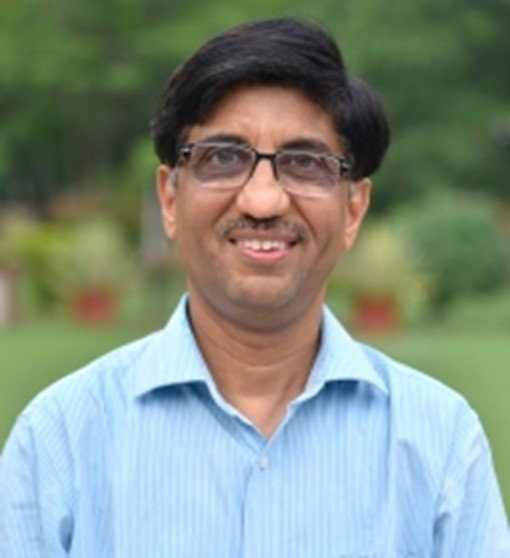
|
Prof. Abhay Karandikar
is currently the Director, Indian Institute of Technology (IIT) Kanpur, one of the premier technical institutes of India. Before joining IIT Kanpur as the Director in April 2018, he served as Institute Chair Professor in the Department of Electrical Engineering at Indian Institute of Technology (IIT) Bombay. He also served as Dean (Faculty Affairs) and Head of the Electrical Engineering Department at IIT Bombay. Prof. Karandikar was the founding member and former Chairman of TSDSI. He was also Member (Part-Time) of Telecom Regulatory Authority of India (TRAI) from January 2017- January 2020. He serves on the board of several companies and has founded and mentored start-ups in telecom and networking. He was member of High-Level Forum on 5G setup by the Government of India and Chaired the 5G Spectrum Policy Task Force.
Prof. Karandikar has several patents issued and pending, contributions to IEEE, 3GPP standards, contributed chapters in books and large number of papers in international journals and conferences to his credit. Prof. Karandikar was awarded with IEEE SA's Standards Medallion in December 2016 in New Jersey. His team also won Mozilla Open Innovation challenge prize in March 2017 for his work on rural broadband and digital empowerment in rural India. He is co-author of papers which won the Best paper awards in ACM MobiHoc 2009, Workshop on Indoor and Outdoor Small Cells WiOpt2014 and finalist for the best paper award in IEEE LCN 2012 and IEEE NCC 2014 conferences. |
||||
|
CASE STUDIES: Academia: Ecosystem in India by Dr. Sundar Vanka, IIT Hyderabad Industry: Ecosystem in India by Mr. Sharad Arora, Sensorise Date & Time: 29th July 2021 (0935-1015 hours) Indian Standard Time |
|||||
| TOP |
|
IEEE 802.11 as the Building Set for Wireless LAN Standards Development by Dr. Sundar Vanka |
|||||
|
ABSTRACT: The IEEE 802.11 standards are a family of wireless LAN (colloquially, "Wi-Fi") standards created by contributing to, borrowing from - and innovating upon - a shared pool of techniques, many of which have been deployed at scale for the past twenty odd years. This building set model permits the independent development of multiple standards targeting widely different applications. For instance, a new wireless LAN IOT standard and V2X standard can be developed and ratified independently, all the while borrowing useful ideas from each other as necessary. This talk provides a flavor of the research activity in the context of the relevant terminology and the processes connected to IEEE 802.11 standards development, with the recently-ratified 802.11-2021 as a case study. The talk ends with a discussion on the open problems and future directions in Wi-Fi. SPEAKER: |
|||||
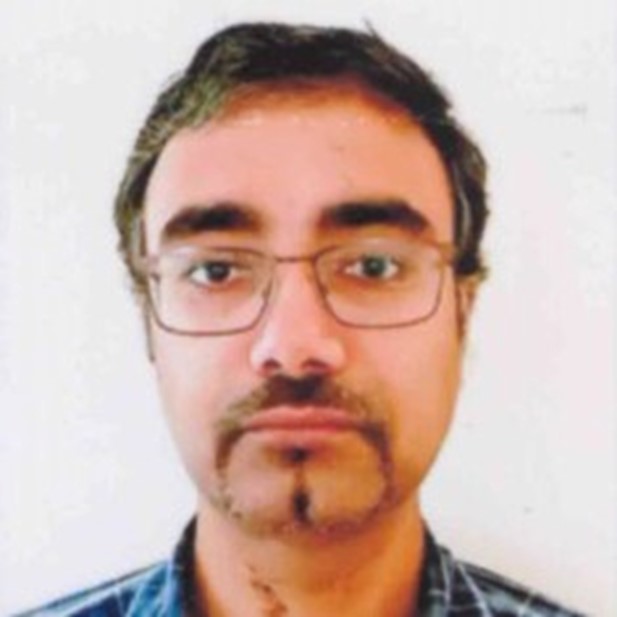
|
Dr. Sundar Vanka is an Associate Professor in the Department of Electrical Engineering, IIT Hyderabad. Prior to joining IITH, Dr. Vanka was an R&D IC Design Engineer in the wireless system architecture group at Broadcom, Inc., in San Jose, California, USA that he joined after obtaining his PhD from the University of Notre Dame, Notre Dame, Indiana, USA in 2012. He was also among the early lead designers of Wi-Fi chipsets at Redpine Signals, Inc., (now part of Silicon Labs), from 2003-2007. Dr. Vanka obtained his B.Tech. and M. Tech. degrees in Electrical Engineering from IIT Madras in 2003. His research interests span the mathematical modeling, simulation and prototyping of wireless systems and networks, especially low power applications. | ||||
|
Standards Driven Telematics/ IoT Ecosystem in India by Mr. Sharad Arora |
|||||
|
ABSTRACT: The talk will cover: Government sponsored standards driven approach to making public transport safer Introduction to AIS 140/ BIS 16833/ TEC M2M SIM Standards From Standards to Deployment - Sustainable steps to ecosystem engagement at scale From Telematics to standards driven Internet of Everything, Make in India SPEAKER: |
|||||
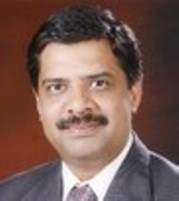
|
Mr. Sharad Arora is the Founder of Sensorise Digital Services. He is serving as Vice Chair, SGSS & GC Member, TSDSI. He is a Technology Evangelist who has expertise in Telecom Technologies & Operator IT and BSS, Certification Authority Technologies and Deployment, Network & Device Security, Machine to Machine Communications, Embedded Systems & IoT, Information Technology for Telecom VAS, SIM Cards, related infrastructure and Security. He has continuously supported the standardisation and policy initiatives for Telecoms, IT, Transport and Urban Development. He has authored / edited in excess of six Technical Reports, three ITU contributions and Several IoT, Security, LPWAN Work Items of TSDSI other than being an active member of four TEC National Working Groups, MTCTE Committee on Certification, Telematics Working Group of Niti Aayog, TEPC, TRAI Consultation, Rapporteur, Smart Cities Standards Advisory Committee, TSDSI Roadmap and Outreach Committee. | ||||
|
Patent Perspective: How to Patent before publishing your paper/standardization By Mr. Pankaj Bhagat Date & Time: 29th July 2021 (1015-1030 hours) Indian Standard Time |
|||||
| TOP | |||||
|
ABSTRACT: The talk will cover: Impact of Publication on patent protection When to publish the paper What's the remedies available after publication What's the process for filing patents SPEAKER: |
|||||
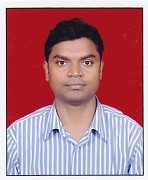
|
Mr. Pankaj Bhagat
has 18+ years of diverse experience in IP Leadership, IP management, licensing and commercialization of IP. Currently, at IITM he is leading 12-members team in the areas of IP management, Patent analytics, Patent prosecution for Indian and Foreign Patents. At IITM, Pankaj has created compelling IP strategy, IP commercialization models and end-to-end IP solutions to cater the requirement of the Institute on par with top Foreign Universities both in value and cost. His leadership helped a small unskilled-office employee into a professional IP team including patent agents that now owns and drives Indian and International strategic IP operations helping to build IP portfolio and achieve NIRF and ARIIA ranking to the institute.
Pankaj was an accomplished Examiner of Patents & Designs at Indian Patent Office, Govt. Of India with a distinction of examining more than 650 Patent applications from diverse technology domain making them in order for grant by the Controller of Patents. Pankaj has also excelled in designing commercial IP strategies and sizeable patent portfolio to Tata Motors Ltd. Pune, Thermax Ltd. Pune and Infosys Ltd, Bangalore previously working as an IP specialist before he joined Indian Institute of Technology Madras (IITM) in May 2018 as Head and Chief Manager-IPM at IC&SR. |
||||
|
Research challenges in the 5G core by Prof. Mythili Vutukuru |
|||||
|
ABSTRACT: This talk will present some of the research challenges in the design and implementation of the 5G core. The 5G core connects the radio access network to external networks. The control plane of the 5G core is responsible for implementing signaling procedures like registration, authentication, session management, and mobility, while the data plane forwards user traffic. We first compare the performance of the various implementation options of the 5G core control plane and discuss how the choice of the underlying network stack impacts the performance of the 5G core components. Next, we look at the costs and benefits of the various implementation options of the 5G core data plane, including evaluating the performance gains due to hardware acceleration of the data plane. The talk will end with a summary of research directions that can drive standardization efforts in the future. SPEAKER: |
|||||
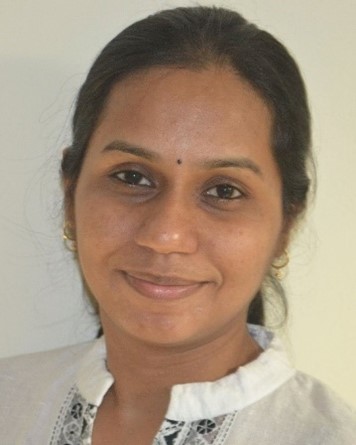
|
Prof. Mythili Vutukuru is an Associate Professor at the Department of Computer Science and Engineering at IIT Bombay. Before joining IITB in 2013, she obtained her Ph.D. and M.S. degrees in Computer Science from the Massachusetts Institute of Technology in 2010 and 2006 respectively. After her Ph.D., she worked at Movik Networks, a start-up in the telecom space, for 3 years before joining IITB. Earlier, she obtained a Bachelors in Computer Science and Engineering from the Indian Institute of Technology, Madras in 2004. | ||||
|
Research opportunities in RAN for 5G and Beyond 5G networks by Prof. Abhinav Kumar |
|||||
|
ABSTRACT: In this talk, we will briefly study the key use cases in 5G. Some PHY and MAC technologies in 5G radio access network (RAN) that enable these use cases will be discussed. Potential advantages and shortcomings of these technologies will be analyzed. The requirements for Beyond 5G networks will be discussed. Based on these requirements, potential research opportunities in RAN for 5G and Beyond 5G networks will be highlighted. SPEAKER: |
|||||
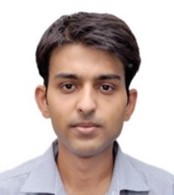
|
Prof. Abhinav Kumar received the BTech+MTech (Dual Degree) and PhD degree in Electrical Engineering from the Indian Institute of Technology Delhi, in 2009 and 2013, respectively. From September to November 2013, he was a research associate in the Indian Institute of Technology Delhi. From December 2013 to November 2014, he was a postdoctoral fellow at the University of Waterloo, Canada. Since November 2014, he has been with Indian Institute of Technology Hyderabad, India, where he is currently an Associate Professor. His research interests are in the different aspects of Wireless Communications and Networking. He is a Senior member of IEEE. | ||||
|
Waveform Design for Wideband THz Communication by Prof. Amit Kumar Dutta |
|||||
|
ABSTRACT: THz communication will become an integral part of the 6G communication, specially in the short-range wide band data transfer. However, due to very large RF frequency and very large bandwidth, it comes with severe bottleneck including frequency dependent channel. In this talk, we discuss a possible transmitter side waveform design based on the parallel OFDM and Filter banks, which may be suitable to counter this frequency dependency. We will also describe a very narrow beam forming technique in the context of MIMO-OFDM THz filter bank system. SPEAKER: |
|||||

|
Prof. Amit Kumar Dutta is currently working as an Assistant Professor at IIT Kharagpur, India. Prior to this, he has worked in Texas Instrument, Broadcom Technology, NxP for almost 14 years in total in the field of DSP/Communication algorithm and System-on-Chip development. He has several IEEE Transactions and granted US patents to his credit. He holds PhD in Wireless communication from Indian Institute of Science, Bangalore. His current research interests include THz communication, General Physical Layer, 6G and beyond, Quantum Signal Processing and VLSI architecture for DSP/Communication. | ||||
|
"Need for active participation by Indian Research Community in formal Standardisation activities"
Remarks by Prof K V S Hari, IISc Bangalore PANEL DISCUSSION: "How to promote Standards Driven Research: What is the incentive?" Moderator: Prof. Ajit Chaturvedi, Director, IIT Roorkee Panelists: Mr. Kishore Babu, DDG-SRI, DoT; Prof. Bhaskar Ramamurthi, Director, IIT Madras; Prof. Huzur Saran, IIT Delhi; Prof. Kiran Kuchi, IIT Hyderabad; Prof. Neelesh Mehta, IISc Bangalore Date & Time: 29th July 2021 (1130-1215 hours) Indian Standard Time |
|||||
| TOP | |||||
|
PANELISTS: |
|||||
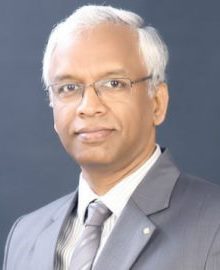
|
Prof. K V S Hari is a Professor in the Department of ECE, Indian Institute of Science, Bangalore. He holds a BE (ECE) degree from Osmania University, Hyderabad, MTech (Radar and Communication Systems) from IIT Delhi and PhD (Systems science) from U C San Diego and has been a visiting faculty at Stanford University and KTH- Royal Institute of Technology, Stockholm. His research interests are in Signal Processing with applications to 5G wireless communications, radar systems, autonomous vehicles, and affordable MRI systems. He is a co-author of an IEEE 802.16 standard on wireless channel models. He was an Editor of EURASIP's Signal Processing from 2006 to 2016 and is currently the Chief Editor (Electrical Sciences) of Sadhana, the journal of the Indian Academy of Sciences published by Springer. He is a Fellow of the Indian National Academy of Engineering and a Fellow of IEEE and also on the Board of Governors, IEEE Signal Processing Society. | ||||
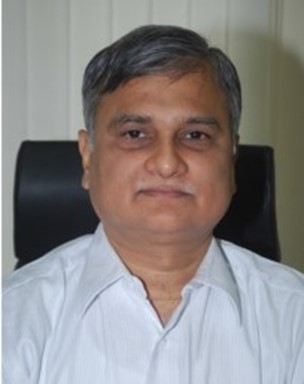
|
Prof. Ajit Kumar Chaturvedi received the B.Tech., M.Tech., and Ph.D. degrees in Electrical Engineering from Indian Institute of Technology Kanpur in 1986, 1988, and 1995, respectively. He served the Department of Electronics Engineering at Indian Institute of Technology, Banaras Hindu University, Varanasi from 1994 to 1996. Subsequently, he joined the faculty of the Department of Electronics and Computer Engineering at Indian Institute of Technology Roorkee. In 1999, he moved to Indian Institute of Technology Kanpur where he also held the positions of Head of the Department of Electrical Engineering, Dean of Research & Development and Deputy Director. He is now the Director of IIT Roorkee. Prof. Chaturvedi was the Coordinator of the BSNL-IITK Telecom Centre of Excellence which has done large number of projects for the Indian telecom sector. He is a recipient of the INSA Teachers award, the Distinguished Teacher award of IIT Kanpur and Tan Chin Tuan Fellowship of Nanyang Technical University, Singapore. He is a founding member of the Telecom Standards Development Society of India (TSDSI). Prof. Chaturvedi was a member of the DoT committee which recommended criteria for spectrum allocation to telecom operators, in 2008. His research interests are in communication theory and wireless communications. | ||||
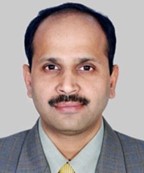
|
Mr. Kishore Babu
is currently DDG-SRI, DoT. He has 28 years of experience in diverse leadership positions in Information & Communication Technologies (ICTs), Telecommunications. He is responsible for Multilateral Cooperation from the Department of Telecommunications with International and Regional Organizations. Kishore Babu has made important contributions on ITU, APT and other Platforms for ITU WTDC, ITSO Assembly Parties meeting, ITU WCIT, WSIS, APT meetings. |
||||
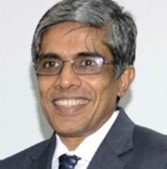
|
Prof. Bhaskar Ramamurthi
got his B.Tech in Electronics from IIT Madras in 1980, and his M.S. and Ph.D in Electrical Engineering from the University of California at Santa Barbara, in 1982 and 1985 respectively. After working at AT&T Bell Laboratories for a couple of years, he joined the faculty of IIT Madras, his alma mater, in 1986. He took over as Director, IIT Madras in September 2011. He played a key role in the formation of Telecommunications Standards Development Society, India (TSDSI) and was its Chair from October 2018 through October 2020.
His areas of specialisation are Communications and Signal Processing. His research work is in Wireless Networks, Modulation, Wireless Data, and Audio and Video Compression. He is currently also honorary Director of the Centre of Excellence in Wireless Technology, a public-private initiative at the IIT-M Research Park to make India a wireless technology leader. He is a Fellow of the Indian National Academy of Engineering, and of the Institute of Electrical and Electronics Engineers (IEEE). He was awarded the Vasvik Award for Electronic Sciences and Technology (2000), the Tamil Nadu Scientist Award for Engineering and Technology (2003), India Semiconductor Association TechnoVisionary Award (2011), Doyens of Madras Award for (2014), ACCS-CDAC Foundation Award (2015) and RWTH Honorary Fellow Award (2020). |
||||

|
Prof. Huzur Saran
is the Head of the Department of Computer Science at IIT Delhi. Prior to joining IIT Delhi in 1990, he did his Ph. D in Computer Science from the University of California, Berkeley in 1989 and, a B.Tech in Electrical Engineering from the Department of Electrical Engineering at the IIT Delhi in 1983. His research is focused on Computer Networks and Algorithms. Prior to this he was the Head of the Amar Nath & Shashi Khosla School of IT, at IIT Delhi.
Prof. Saran has been actively working in 4G wireless technologies. During 2000-2002 he was a Visiting Professor at the Information Systems Lab, Stanford where he worked on the media access control layer of an exploratory 4G wireless systems. He has been investigating wireless access and mesh technologies to enable ICT for rural masses. More recently his group has been working on a rural content distribution framework for building disruption tolerant applications and in the area of peer-to-peer audio/video collaboration frameworks for online education (supported in part under the National Mission on Education through ICT). Dr Saran has also collaborated in the past with AT&T Research and Lucent Bell Labs in the area of Network Performance Analysis as a consultant (during 1993-2000). Dr Saran has also been a consultant during 2004-2010 to Solidcore Inc, a Software Startup. During this time he helped define and build a novel software protection technology for critical servers and embedded products. Solidcore was purchased by Mcafee in 2009 for its pathbreaking Dynamic Whitelisting technology. |
||||
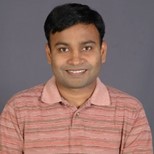
|
Prof. Kiran Kuchi a professor at IIT Hyderabad, is a globally recognized innovator in the realm of 5G standards development. He has introduced the culture of developing wireless Standards Related Patents in India through his leadership role at Telecom Standards Development Society, India (TSDSI) and has contributed towards the creation of several important technologies in the 5G standards. Dr. Kuchi has invented & co-invented over 100 patents in the 4G/5G technology, of which more than 50 patents have resulted from his work carried out in India. | ||||
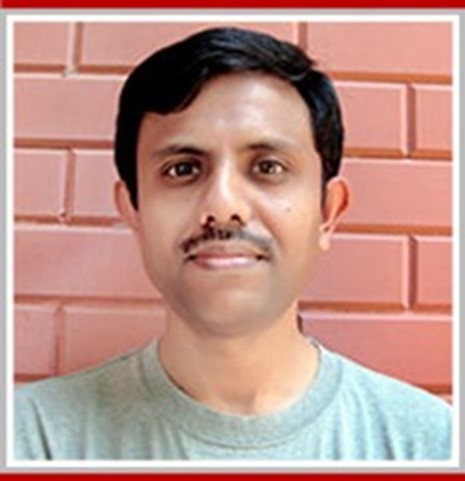
|
Prof. Neelesh B. Mehta is a Professor in the Department of Electrical Communication Engineering at the Indian Institute of Science (IISc), Bangalore. His research focuses on wireless communications. He has worked on 3G/4G/5G cellular communication standards, energy harvesting and green wireless sensor networks, cognitive radio, cooperative communications, multi-antenna technologies, and multiple access protocols. He is a Fellow of the IEEE, Indian National Science Academy (INSA), Indian National Academy of Engineering (INAE), and National Academy of Sciences India (NASI). He is a recipient of the prestigious Shanti Swarup Bhatnagar Award, DST-Swarnajayanti Fellowship, NASI-Scopus Young Scientist Award, Hari Om Ashram Prerit Vikram Sarabhai Research Award, and the INAE Young Engineer Award. He currently serves on the Steering Committee of the IEEE Transactions on Wireless Communications and on the IEEE ComSoc Awards committee. In the past, he has served as an editor for the IEEE Wireless Communication Letters and Journal on Communications and Networks. He served as an editor of the IEEE Transactions on Communications during 2013-19. He served on the Executive Editorial Committee of the IEEE Transactions on Wireless Communications during 2014-17 and was its Chair during 2017-18. He served on the Board of Governors of the IEEE Communications Society from 2012-15. | ||||
|
Closing Remarks and Way Forward By Ms. Pamela Kumar, Director General, Telecommunications Standards Development Society, India (TSDSI) Date & Time: 29th July 2021 (1215-1230 hours) Indian Standard Time |
|||||
| TOP | |||||
|
SPEAKER: |
|||||

|
Pamela Kumar
is Director General, Telecommunications Standards Development Society (TSDSI), Founding Chair & Current President of CCICI and the Bharti Chair Visiting Professor at UIET Panjab University.
Since her joining TSDSI as Director General in early 2017, TSDSI has made a mark in the global standards arena - with its contribution of the Low Mobility Large Cell (LMLC) requirement for 5G Rural broadband in ITU and later approval of its Radio Interface Technology (RIT) - 5Gi as an IMT2020 technology standard by the ITU. She drove adoption of TSDSI Transposed oneM2M as the national standard for IoT/M2M in India. She worked with Department of Telecom to conceptualise 5G High Level Forum, leading several of its task forces and is now actively driving execution of its recommendations. TSDSI has forged deep partnerships with global SDOs and forums under her watch. She spent the first 10 years of her career at AT&T, Bell Labs in USA and at C-DOT in Bangalore. Later, she held leadership positions in Texas Instruments, IBM, Hewlett Packard Enterprise, R&D labs in India. She also did a short stint with 2 startups, setting up the R&D centers of Network Programs and Alliance Semiconductors. She holds 3 Patents granted by USPTO and has 5 patent applications pending in the Networking Accelerators domain. She has been a Keynote/ invited speaker in 90+ Local and Global forums. Pamela has held various honorary positions - Vice Chair of 3GPP PCG, member of the IEEE-SA Nominations & Appointments Committee, Member at large- IEEE Standards Association Board of Governors, Chair of the IEEE Charles Steinmetz Awards Committee, General Chair of IEEE ANTS Conference & COMSNETS Conference, Coordinator Industry Relations for IEEE Region 10, Chair for IEEE Computer Society Chapter & Vice Chair of IEEE Bangalore section, etc. Pamela earned her B.E in Electronics and Electrical Communication from Punjab Engineering College Chandigarh, Master's degree in Electrical Engineering from Rutgers University, USA and Executive MBA from IIM Bangalore. She is passionate about the role of technology in driving quality of life and socio-economic development. She firmly believes that national and international collaborations between Industry, Academia and Government are key enablers for sustainable development. |
||||
Applications of Machine Learning
Machine learning for sound sensing
Contextualized deep graph infomax for multi-layer networks
Personalizing Federated Learning to the Edge Device
AI vs ML -- an introduction
|
Machine learning for sound sensing By Prof. Mark Plumbley Date & Time: 30th July 2021 (1520-1600 hours) Indian Standard Time |
|||||
| TOP | |||||
|
ABSTRACT: Imagine you are standing on a street corner in a city. Close your eyes: what do you hear? Perhaps some cars and busses driving on the road, footsteps of people on the pavement, beeps from a pedestrian crossing, and the hubbub of talking shoppers. You can do the same in a kitchen as someone is making breakfast, or as you are travelling in a vehicle. Now, following the success of AI and machine learning technologies for speech and image recognition, we are beginning to build computer systems to automatically recognize real- world sound scenes and events. In this talk, we will explore some of the work going on in this rapidly expanding research area, and discuss some of the potential applications emerging for sound recognition, from home security and assisted living to environmental noise and sound archives. We will also outline how we are adopting participatory methods, such as a virtual world cafe approach, to direct project outcomes from stakeholders, and so help us realise the potential benefit of sound sensing to society and the economy. SPEAKER: |
|||||
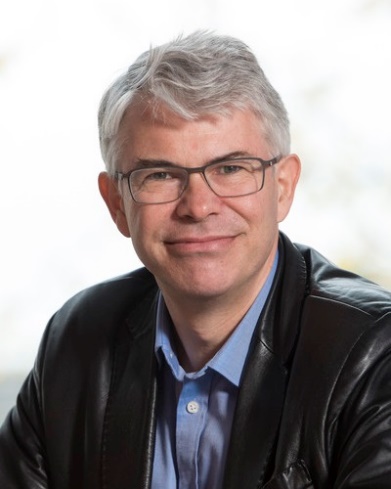
|
Prof. Mark Plumbley is Professor of Signal Processing at the Centre for Vision, Speech and Signal Processing (CVSSP) and Head of School of Computer Science and Electronic Engineering at the University of Surrey, in Guildford, UK. He is an expert on analysis and processing of audio, using a wide range of signal processing and machine learning methods. He led the first international data challenge on Detection and Classification of Acoustic Scenes and Events (DCASE), and is a co- editor of the recent book on "Computational Analysis of Sound Scenes and Events" (Springer, 2018). He currently holds a 5-year EPSRC Fellowship "AI for Sound" on automatic recognition of everyday sounds. He is a Member of the IEEE Signal Processing Society Technical Committee on Audio and Acoustic Signal Processing, and a Fellow of the IET and IEEE. | ||||
|
Contextualized deep graph infomax for multi-layer networks By Prof. Balaraman Ravindran Date & Time: 30th July 2021 (1600-1640 hours) Indian Standard Time |
|||||
| TOP | |||||
|
ABSTRACT: The InfoMax principle has been gaining popularity as an approach to learning representations in deep neural networks. In this talk, I will introduce the graph InfoMax criterion and how it is applied in graph neural networks. Multiplex networks are complex graph structures in which a set of entities are connected to each other via multiple types of relations, each relation representing a distinct layer. Such graphs are used to investigate many complex biological, social, and technological systems. In this talk, I will present a novel semi-supervised approach for structure-aware representation learning on multiplex networks. Our approach relies on maximizing the mutual information between local node-wise patch representations and label correlated structure-aware global graph representations to model the nodes and cluster structures jointly. The proposed architecture outperforms state-of-the-art methods in a range of tasks: classification, clustering, visualization, and similarity search on seven real-world multiplex networks for various experiment settings. The work will appear in ACM SIGKDD 2021. SPEAKER: |
|||||
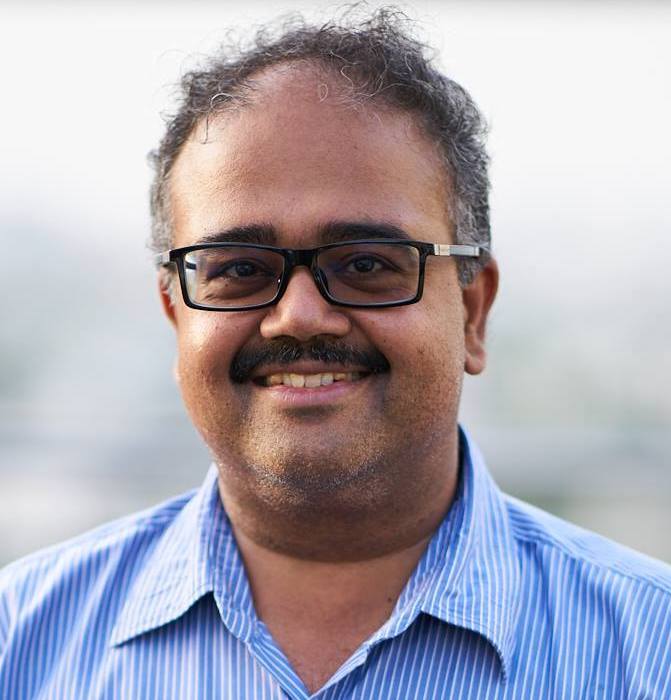
|
Prof. Balaraman Ravindran Professor B. Ravindran heads the Robert Bosch Centre for Data Science & Artificial Intelligence (RBCDSAI) at IIT Madras, the leading interdisciplinary AI research centre in India. He is the Mindtree Faculty Fellow and Professor in the Department of Computer Science and Engineering at IIT Madras. He has held visiting positions at the Indian Institute of Science, Bangalore, India, University of Technology, Sydney, Australia and Google Research. Currently, his research interests are centred on learning from and through interactions and span the areas of geometric deep learning and reinforcement learning. He is currently serving on the editorial boards of Machine Learning Journal, Journal of AI Research, PLOS One, and Frontiers in Big Data and AI. He has published nearly 100 papers in premier journals and conferences. He received his PhD from the University of Massachusetts, Amherst and his Master’s degree from the Indian Institute of Science, Bangalore. He is a senior member of the Association for Advancement of AI (AAAI). | ||||
|
Personalizing Federated Learning to the Edge Device By Prof. Venkatesh Saligrama Date & Time: 30th July 2021 (1810 - 1850 hours) Indian Standard Time |
|||||
| TOP | |||||
|
ABSTRACT: We propose a novel method for federated learning that is customized to the objective of a given edge device. In our proposed method, a server trains a global meta-model by collaborating with devices without actually sharing data. The trained global meta-model is then customized locally by each device to meet its specific objective. Different from the conventional federated learning setting, training customized models for each device is hindered by both the inherent data biases of the various devices, as well as the requirements imposed by the federated architecture. We present an algorithm that locally de-biases model updates, while leveraging distributed data, so that each device can be effectively customized towards its objectives. Our method is fully agnostic to device heterogeneity and imbalanced data, scalable to massive number of devices, and allows for arbitrary partial participation. Our method has built-in convergence guarantees, and on benchmark datasets we demonstrate that it outperforms other state-of-art methods. SPEAKER: |
|||||
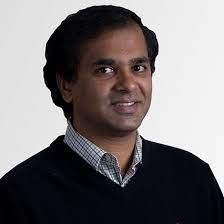
|
Prof. Venkatesh Saligrama is currently is a faculty member in the Department of Electrical and Computer Engineering, the Department of Computer Science (by courtesy), and a founding member of the Faculty of Computing and Data Sciences at Boston University. He holds a PhD from MIT. His research interests are broadly in the area of Artificial Intelligence, and his recent work has focused on machine learning with resource-constraints. He is an IEEE Fellow and recipient of several awards including Distinguished Lecturer for IEEE Signal Processing Society, the Presidential Early Career Award (PECASE), ONR Young Investigator Award, the NSF Career Award. More information about his work is available at http://sites.bu.edu/data | ||||
|
AI vs ML -- an introduction By Prof. Bhiksha Raj Date & Time: 30th July 2021 (1850 - 1930 hours) Indian Standard Time |
|||||
| TOP | |||||
|
ABSTRACT: "Artificial Intelligence" and "Machine Learning" have become popular buzz phrases in both the technical and lay communities. Often the terms are used interchangeably. But what are AI and ML, and what is the difference between the two? In this talk we will try to explain the concepts and distinguish between them using simple examples aimed at a lay audience. The talk will be somewhat interactive; the audience is required to arrive with no more than their smarts; no prior technical expertise is assumed. SPEAKER: |
|||||
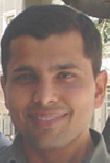
|
Prof. Bhiksha Raj is a professor in the language technologies institute of the school of computer science, at Carnegie Mellon University. He is also affiliated with the Machine Learning and Electrical at CMU. Prof Raj's research interests lie at the intersection of Machine Learning, Signal Processing, and Privacy and Security, particularly applied to voice signals. He is a fellow of the IEEE. | ||||











